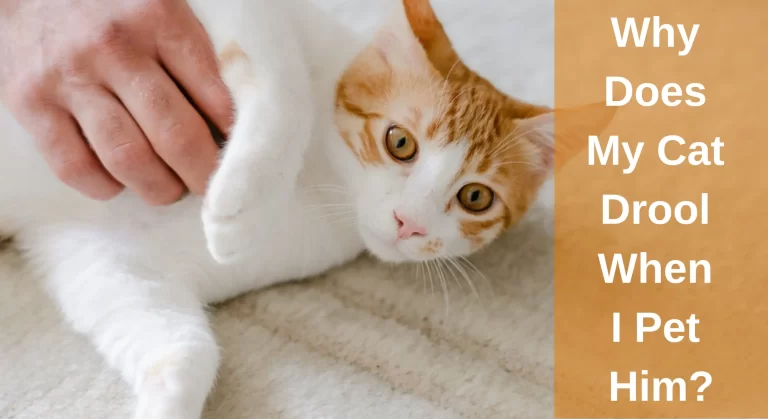Will My Cat Come Back If I Let Him Outside? Curiosity Unleashed
Letting your cat out for the first time can be a frightening event, and you may be wondering when you can safely release them into the great wide world. There are some things you should consider before letting them roam free.
First, it’s important to understand that cats are natural explorers. They have a strong instinct to hunt and explore their surroundings, which can make it difficult to keep them indoors all the time. However, letting your cat outside can be risky, as there are many dangers that can pose a threat to their safety. From cars and other animals to harsh weather conditions, there are many things that can put your cat in danger when they’re outside.
So, will my cat come back if I let him outside? The answer is yes, but there are some things you can do to increase the likelihood that they’ll return home safely. By providing your cat with the proper training and preparation, you can help ensure that they’re ready to handle the challenges of the great outdoors.
Read on to find out! How you can teach your cat to go outside and return home safely and what to do if your cat goes missing.

How Long Should I Wait Before Allowing My Cat to Go Outside?
Determining the appropriate waiting period before introducing your cat to the great outdoors depends on its individual temperament and how quickly they acclimate.
For adults, it’s recommended to wait for a period of 2-3 weeks, and up to 4-6 weeks, before allowing your cat to go outside. This timeframe allows the cat to adjust and become familiar with their new environment, reducing the risk of them getting lost or disoriented.
For kittens, it is advisable to wait until they are around 4 months old, has been neutered or spayed, received all necessary vaccinations, and have fully settled into your home. This ensures that they are physically and emotionally ready to explore the outside world while minimizing potential hazards.
Will My Kitten Run Away if I Let It Outside?
There is no sure way to know if your kitten will run away if you let it outside. Some kittens are more adventurous than others and may be more likely to explore their surroundings, which could lead them to wander off. However, other kittens may be more content to stay close to home.
How Do You Teach a Cat to Go Outdoor and Return?
will my cat come back if I let her outside? Absolutely! However, when it comes to allowing an indoor cat to venture outdoors for the first time, it’s crucial to take necessary precautions and adequately prepare them for the vast outside world.
Although it’s natural for cats to feel curious about the outdoors, you cannot simply open the door and let them dash out. It’s important to ensure that they are fully prepared for this new experience. As a responsible pet owner, how can you make this decision?
The key lies in gradually introducing your cat to the outdoor environment, enabling them to transition smoothly and ensuring they always find their way back home. Here are all the steps you should go through to ensure your cat can survive outside and always makes it back.

1. Take Their Breed Into Account
The majority of cats are well-suited to outdoor living and thoroughly enjoy spending time outside. However, it’s important to note that there are certain breeds that are not suitable for outdoor environments and are better off as indoor-only cats.
For instance, hairless breeds like the Sphynx face challenges in the great outdoors. Their lack of fur makes it difficult for them to regulate their body temperature, rendering them vulnerable to extreme weather conditions. Similarly, the Cornish Rex and Devon Rex, with their extremely short coats, are also better kept as indoor cats.
Additionally, breeds known for their docile nature and preference for lap sitting are not the best candidates for outdoor adventures. Examples of such breeds include Ragdolls, Persians, and Russian Blues. These cats have gentle temperaments and are not inclined to engage in catfights. They find contentment in sleeping and snuggling up next to their human companions.
It’s important to assess your cat’s breed characteristics, personality, and physical traits when deciding whether to allow outdoor access. Always prioritize their safety and well-being to ensure a fulfilling and comfortable life for your feline friend.
2. Consider Their Age (Adult or Kitten)
Age is a significant factor in determining if your cat is prepared to explore the outdoors. It is crucial to consider their age and take necessary precautions to guarantee their safety and overall well-being.
For kittens, it’s advisable to hold off on letting them outside until they reach approximately 4 months of age. This timeframe allows the kitten to become fully settled in your home, establishing a strong sense of familiarity and a clear understanding of where they should return. By this age, they should have received their necessary vaccinations and been neutered, ensuring their safety while exploring the outside world.
When it comes to adult cats, the approach is slightly different. If you have recently adopted an adult cat, it is recommended to give them a period of 4-6 weeks to acclimate to their new environment before granting them outdoor access, even if they were previously accustomed to being outdoors. This adjustment period allows them to recognize your house as their new home and feel more secure in their surroundings.
But what about indoor cats that display a strong desire to go outside? If your cat shows signs of readiness and eagerness to explore the outdoor environment, it may be an indication that they are prepared. By this stage, they are likely aware that your home is their territory, and as adults, they should have received all necessary vaccinations and have been spayed or neutered. If they demonstrate a keen interest in venturing outside, it can be considered safe to allow them to do so.
Conversely, domestic cats that are content and fulfilled with their indoor lives should not be forced or rushed into going outside prematurely. Forcing such cats into an unfamiliar outdoor environment could cause them significant stress. It is essential to evaluate each cat’s unique situation separately and make a decision based on what is best for their well-being.
3. Ensure Your Cat Can Be Identified
Once you have determined that your cat is mentally prepared for outdoor exploration, it is crucial to ensure that it can be easily identified in the event of getting lost. One of the most effective measures is to have your cat microchipped.
Getting your cat microchipped involves inserting a small electronic chip under their skin, typically between the shoulder blades. This chip contains a unique identification number that is associated with your contact details. If your cat goes missing and is found by a shelter or veterinarian, they can use a scanner to read the microchip and retrieve the information linked to it. This greatly increases the chances of a swift reunion with your lost cat.
Even if your cat is microchipped, it’s recommended to also provide them with a collar that displays your mobile number. Microchips can only be read using a scanner, whereas a collar with your contact details allows for easier access to your information. This increases the chances of a swift return if your cat becomes lost.
Equipping your cat with a collar also signals to others that they have a home and a caring owner, reducing the likelihood of them being mistaken for a stray. Sometimes, well-intentioned individuals may feed a wandering cat, inadvertently causing them to stray further from home. Discouraging such actions minimizes the chances of your cat finding a new unintended home.
4. Create a Safe Outdoor Environment
While many cats enjoy exploring beyond the boundaries of your garden, it’s important to establish a safe and appealing outdoor space that encourages them to stay close to home. Transforming your garden into a cat-friendly haven is a straightforward process that can provide enrichment and reduce the likelihood of them straying too far. Consider the following measures:
- Provide elevated areas: Install perches or create vertical spaces that allow your cat to climb and observe the surroundings. This gives them a sense of security and a vantage point to survey their territory.
- Create hiding spots: Designate enclosed areas, such as cozy shelters or covered structures, where your cat can retreat to when they need privacy or feel the need to hide.
- Bring a food and toy with you: Bring a food, or toy incentive with you and sit quietly. You can keep an eye on your cat while letting them roam freely and call them back if they wander too far away.
- Plant cat-friendly greenery: Incorporate non-toxic plants that are safe for cats to explore and sniff. This adds sensory stimulation and allows them to indulge their natural curiosity.
- Offer weather protection: Ensure there are suitable shelters or covered areas that provide protection from harsh weather conditions, such as rain or excessive heat. This allows your cat to seek refuge when necessary.
- Provide scratching opportunities: Install a scratching post or dedicate a tree for your cat to scratch. This satisfies their natural urge to sharpen their claws and helps prevent them from using furniture or other undesirable surfaces.
- Create sunny spots: Leave open areas in your garden where your cat can bask in the sun and enjoy some relaxation time.
It is equally important to eliminate potential hazards from your garden. Cover ponds or water features to prevent accidental falls or ingestion of pond water. Be cautious about using weed killers or pest control chemicals that may be toxic to cats, and opt for environmentally-friendly alternatives that pose no risk to their health.
Additionally, ensure that your outdoor space always provides access to shelter, water, and food. By meeting these essential needs within the confines of your garden, you reduce the likelihood of your cat venturing elsewhere to fulfill them. In situations where you are not present, a safe and well-equipped backyard ensures that your cat can seek shelter and find the necessary resources until your return.
5. Accompany Your Cat outside
Once your cat is ready for outdoor exploration and your outdoor space is prepared, it’s important to accompany them during their initial outdoor ventures. Go outdoors and leave the front door open so your cat may join you but also swiftly return inside if they wish. Follow these steps to ensure a smooth transition:
- Avoid forcing your cat outside: Instead, open the door and let them decide whether they want to venture out. Entice them with treats and create a positive association with the outdoors.
- Go outside together: Step outside and leave the door open so that your cat can follow if they feel comfortable. Take their treats with you and find a spot to observe as they explore. Cats are naturally cautious and will typically move at their own pace, taking in their surroundings.
- Set boundaries: If your cat starts to wander too far or tries to leave the designated area, gently call them back and reward them with a treat. This helps them understand their limits and reinforces the idea of coming back when called.
- Gradually increase outdoor time: Initially, limit the duration of their outdoor sessions to around 30 minutes. Observe your cat’s behavior and adjust the time accordingly. Confident cats may be allowed longer periods, while more timid cats may require shorter sessions to avoid overwhelming them.
- Consider a leash or harness: For added control and safety, you can introduce a cat leash or harness. It’s best to accustom cats to these from a young age. However, adult cats may require more patience and a gradual introduction. Keep in mind that some cats prefer independent exploration and may not readily accept being tethered to you. Experiment and find what works best for your cat.
By going outside with your cat and gradually extending their outdoor time, you ensure their safety, monitor their behavior, and strengthen the bond between you and your feline companion.
Also Read: Why Do Cats Run Away From Home?
6. Allow Unaccompanied Outdoor Time
Once your cat displays confidence in exploring your garden, you can grant them unaccompanied outdoor access. It’s natural to feel concerned if your cat ventures beyond the garden boundaries, but rest assured that it’s often a positive sign of their comfort and independence. In most cases, they will return on their own within a few minutes.
After spending some time outside, your cat may make their way back to the door without any assistance. Cats have a remarkable ability to find their way home without relying on vocal calls. When they return, welcome them back inside and offer a reward as positive reinforcement.
If your cat hasn’t returned within a reasonable timeframe and you start to worry, try calling their name and enticing them with treats. Often, the familiar sound and enticing scent will prompt them to return promptly, hopping over fences or obstacles to rejoin you indoors.
Remember, each cat is unique, and their outdoor behaviors may vary. Trust their instincts and give them the freedom to explore while ensuring their safety and well-being.
How To Train Your Cat to Come When Called?
Training a cat to go outside and come back when called requires patience, consistency, and positive reinforcement. Here are some steps to help you in the training process:

- Start with basic recall training: Teach your cat to respond to their name by calling them and rewarding them with treats or praise when they come to you. Repeat this process multiple times.
- Reinforce recall indoors: Practice calling your cat from different areas of your home. Reward them with treats and praise when they respond to their name and come to you.
- Test recall in separate rooms: Call your cat from separate rooms to ensure they respond to your call even when they can’t see you. Reward their successful response with treats and affection.
- Practice in different areas: Extend the training to different parts of your home to reinforce their understanding of the recall cue. This helps them generalize the recall behavior across different environments.
- Use a consistent cue: Choose a specific word or sound as a recall cue, such as their name or a whistle. Pair this cue with positive reinforcement, such as treats or affection, whenever your cat responds and comes back to you.
- Use treats and shaking sounds: When calling your cat, shake a bag of their favorite treats to get their attention and reward them when they come to you.
- Transition to outdoor recall: Once your cat consistently responds to their name indoors, you can start practicing outdoor recall in a controlled and safe environment.
- Create a positive association: Make the experience of coming back indoors rewarding for your cat. Have treats or their favorite toys ready when they return, and provide praise and affection to reinforce the behavior.
- Call them back at night: When it’s time for your cat to come inside for the night, call their name and shake their treats to signal it’s time to return home.
Remember to be patient and use positive reinforcement during the training process. With consistent practice, your cat will learn to come when called and return home safely.
Benefits of Letting Your Cat Outside
Considering whether to let your cat outside involves weighing the benefits and risks. Here are the key points to help you make an informed decision:

Natural Behaviors
Outdoor exploration allows cats to engage in hunting, jumping, climbing, scratching, and exploring, fulfilling their innate instincts and promoting overall happiness. It provides an opportunity for cats to exercise different muscle groups and maintain a healthy weight.
Provides Mental Stimulation
The outdoor environment offers a wide range of stimuli, including new smells, sights, sounds, and tastes. This enriches a cat’s mental well-being, preventing boredom and reducing the likelihood of destructive behavior or aggression at home.
Gives Them Personal Space
Allowing cats to go outside grants them the freedom to find personal space when needed. It acts as a form of escapism, particularly in situations where the home may be overwhelming or crowded. If outdoor access is not possible, providing hiding places within the home can offer a sense of security.
Lets Them Enjoy the Sunshine
While cats do not rely on sunlight for Vitamin D synthesis, they are naturally drawn to warmer areas. Lounging in the sun allows cats to bask in the warmth, which aligns with their higher core body temperature. It contributes to their contentment and satisfaction.
Risks of Letting Cats Outside

Car Traffic Accidents
Cats roaming outdoors are at risk of being hit by cars, especially during nighttime when visibility is reduced. Younger cats and unneutered cats are more prone to accidents as they may be less experienced or roam further in search of a mate.
To mitigate this risk, it’s advisable to neuter your cat, only allow outdoor access during daylight hours, consider the traffic in your area, provide a secure outdoor space in your garden, and use reflective collars to increase visibility at night.
Catfights
When outdoor cats encounter neighboring cats, conflicts may arise, leading to catfights and potential injuries. Neutering your cat can help reduce the likelihood of fights, but territorial disputes can still occur.
Over time, cats may learn to coexist and share territory, but initial introductions or moving to a new area may increase the risk of fights.
Disease & Parasitic Infections
Outdoor cats can contract diseases from other cats or the environment. Vaccinating your cat can protect against common diseases. Cats are also susceptible to parasites such as fleas, worms, and ticks, which can be acquired outdoors.
Regular flea control measures, such as using flea collars, and deworming your cat can help prevent infestations. Consult your veterinarian for advice on preventing and treating parasitic infections.
Getting Lost
The possibility of a cat getting lost is a significant concern for owners. While cats have a strong sense of direction, certain measures can be taken to ensure their safe return if they do get lost. Settling your cat in their new home and ensuring they respond to their name when called can help establish a bond and familiarity with their surroundings.
Microchipping and using collars with identification tags are crucial in increasing the chances of finding a lost cat. Additionally, providing a safe shelter within your garden can discourage them from seeking shelter in other properties.
Factors That Assist Your Kitty Buddy in Returning Home on their Own

1. Cat’s Sense of Direction
Cats have remarkable senses, including a keen sense of smell, hearing, and vision, which aid them in finding their way home. They can use familiar scents and landmarks to navigate their surroundings.
Additionally, some studies suggest that cats have the ability to sense Earth’s magnetic fields, which may contribute to their sense of direction.
2. Familiarity with the Territory
Cats are territorial animals, and they develop a strong sense of familiarity with their surroundings and the ability to track the scent of their owners or familiar locations over long distances.
They create mental maps of their territory, memorizing landmarks, routes, and hiding spots. This knowledge helps them navigate back to their home even if they venture far away.
3. Homing Instinct
It is believed that cats have a natural homing instinct, an innate ability to find their way back home. This instinct may be influenced by a combination of factors, including their senses, memory, and an innate sense of direction.
Top Hints For Locating a Missing Cat
If your cat has gone missing, here are some additional steps you can take to aid in the search and increase the chances of finding your cat:

- Check the Neighbor’s House: Approach your neighbors and kindly ask them to check their garages, sheds, and any other buildings where your cat could potentially be trapped or hiding. Cats may seek shelter in unfamiliar places when scared or disoriented.
- Broaden Your Search: Extend your search to three to five homes in either direction from your residence. Cats can wander further than expected, especially if they are used to being outdoors. Expand your search radius to cover a larger area.
- Thoroughly Search Your Home: Conduct a comprehensive search of your entire home, both inside and outside. Cats can sometimes find hiding spots within the house that may not be immediately apparent. Look in closets, under furniture, behind appliances, and in any nooks and crannies where your cat could be hiding.
- Vary Your Search Times: Cats are most active during the late night and early morning hours when the surroundings are calm. Try searching during these times as well, as your cat may feel more comfortable exploring or responding to familiar sounds.
- Repeat and Double-Check: Repeat your search in the same locations multiple times. Cats can become frightened and may remain in hiding, even if you’ve already searched an area. Double-check previous search spots to ensure you haven’t missed any potential hiding places.
- Utilize Online Platforms: Post information about your lost pet on social networking platforms like Facebook, Nextdoor.com, and PetAmberAlert.com. Include a clear description, a recent photo of your cat, and your contact information. This will help spread the word and increase the chances of someone recognizing and reporting any sightings.
- Set Up Traps: If you suspect that your cat may still be in the vicinity, you can set up humane traps in your home or garage. Place enticing food inside the trap to lure your cat in. Monitor the trap regularly and handle any captures with care.
- Post Eye-Catching Posters: Create and post large, eye-catching posters with your lost pet’s information throughout the area. Use brightly colored paper and include a clear photo, your contact details, and any distinctive features of your cat. Place the posters in visible locations such as community bulletin boards, local shops, and busy intersections.
Frequently Asked Questions
How far do lost cats roam?
The median distance that a lost cat travels is 315 meters (344 yards). However, some cats have been known to travel much further, up to 50-80 miles in 2.5 years. It is important to note that the distance a cat travels will vary depending on a number of factors, such as the cat’s personality, the environment, and whether or not the cat is familiar with the area.
Do cats come back when they run away?
Yes, cats can come back when they run away. In fact, according to a study by Lost Pet Research, 67% of indoor-outdoor cats and 25% of outdoor-only cats are able to find their way back home after being lost. However, it is important to note that not all cats will come back, and there are a number of factors that can affect their chances of returning, such as how long they have been gone, whether they are injured or scared, and whether they are familiar with the area.
Can cats find their way home if lost?
Yes, cats can find their way home if lost. They have a homing instinct that helps them navigate their way back to their territory. This instinct is thought to be due to a combination of factors, including their sense of smell, their ability to see the Earth’s magnetic field, and their memory of the route home.
However, not all cats will be able to find their way home, and there are a number of factors that can affect their chances, such as how far they have traveled, whether they are injured or scared, and whether they are familiar with the area.
Can cats be trained to walk on a leash?
Yes, many cats can be trained to walk on a leash. It requires patience, positive reinforcement, and gradually introducing the leash and harness.
Should I let my cat outside at night?
No, It’s highly recommended to keep cats indoors at night due to increased risks and potential dangers, such as predators or reduced visibility.
Will my cat be unhappy if I don’t let them outside?
Cats can lead fulfilling lives indoors with proper enrichment and stimulation. By providing a stimulating environment, regular playtime, and social interaction, you can keep your cat content and happy.
How can I ensure my indoor cat doesn’t become bored?
Keep your cat engaged by providing interactive toys, puzzle feeders, and opportunities for play and exercise. Consider creating a stimulating indoor environment with scratching posts, perches, and designated play areas.
Final Verdict!
Yes, it is generally possible for kittens to come home when introduced to the outside world gradually and with proper supervision. However, it’s important to be aware that there are risks involved. Cats can become lost, taken in by someone else, trapped, or injured when allowed outside. Therefore, it’s crucial to take the necessary precautions and provide a safe and secure environment for your kitten if you decide to let them explore outdoors.
This may include gradually increasing their outdoor access, ensuring they are supervised, providing identification such as a collar with tags or microchipping, and creating a secure outdoor space like a catio or enclosed garden.
Who is Isabella?
My name is Isabella, and I am a dedicated and knowledgeable cat enthusiast. With years of experience caring for cats and a deep love for felines, I made a mission to help other cat lovers navigate the challenges of cat ownership.






